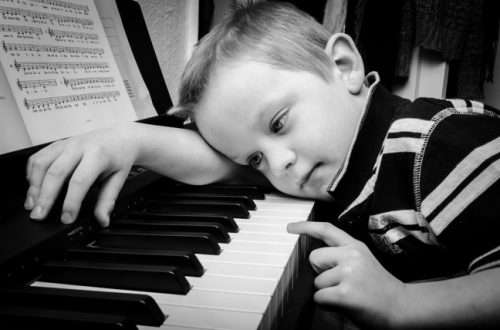
Music school: parents’ mistakes
Contents
Your child has started studying at a music school. Only a month has passed, and interest has been replaced by whims when doing homework and an unwillingness to “go to music”. Parents worry: what did they do wrong? And is there any way to fix the situation?
Mistake #1
One of the common mistakes is that parents are too persistent when doing the first solfeggio tasks with their children. Solfeggio, especially at the beginning, seems to be just a drawing lesson that is not related to music: calligraphic derivation of a treble clef, drawing notes of different durations, and so on.
Advice. Do not rush if the child is not good at writing notes. Do not blame the child for ugly notes, crooked treble clef and other shortcomings. For the entire period of study at school, he will still be able to learn how to do it beautifully and correctly. In addition , computer programs Finale and Sibelius were invented long ago, reproducing all the details of the musical text on the monitor. So if your child suddenly becomes a composer, he will most likely use a computer, and not a pencil and paper.

Mistake #2
Parents practically do not attach importance to which teacher will teach the child at a music school.
Advice. Chat with your mothers, with someone from musically educated acquaintances, and finally, just take a closer look at those teachers who go around the school. Do not sit and wait for strangers to identify your child to a person who is psychologically incompatible with him. Act yourself. You know your child very well, thanks to which you can understand which person it will be easiest for him to find contact with. In turn, without contact between the student and the teacher, who will later become his mentor, musical progress is impossible.
Mistake #3
The choice of instrument is not according to the child, but according to oneself. Agree, it is difficult to arouse a desire in a child to study if his parents sent him to the violin, and he himself wanted to learn to play the trumpet.
Advice. Give the child to the instrument that he likes. Moreover, all instrumental children, without exception, master the piano within the framework of the “general piano” discipline, which is mandatory in the music school. If you really need to, you can always agree on two “specialties”. But double-load situations are best avoided.
Mistake #4
Music blackmail. It’s bad when a home musical task is turned by a parent into a condition: “If you don’t work out, I won’t let you go for a walk.”
Advice. Do the same, only in reverse. “Let’s take a walk for an hour, and then the same amount – with an instrument.” You yourself know: the carrot system is much more effective than the stick system.
Recommendations if the child does not want to play music
- Analyze your exact situation. If the question of what to do if the child does not want to play music is really important and serious for you, then calmly, without emotions, constructively first determine the exact reasons. Try to understand why it is your child, in this music school, who does not want to study in these musical subjects.
- Make sure that your child does not have a momentary change of mood to some difficult task or negative situation, but a decision expressed deliberately, after several months or even years of obedience and discomfort.
- Look for errors in your approach to learning, in your own behavior, or in your child’s reactions.
- Think about what you could do to change the child’s attitude to music and music lessons, how to increase interest in classes, how to organize learning wisely. Naturally, these should be only benevolent and thoughtful measures! No coercion from under the stick.
- After you’ve made every possible effort, ask yourself if you’re willing to accept your child’s decision to quit music? Will you later regret a hasty decision that quickly solves the problem? There are many cases when a child, having become older, blames his parents for not convincing him to continue to play music.





